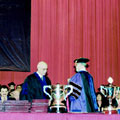|
|
 |
 |
|
 |
|
 |
 |
 |
 |
 |
|
 |
|
 |
|
 |
|
|
|
 |
|
|
|
 |
|
|
|
|
|
Department of Computer Science
School of Sciences and Engineering
Distinguished Lecturer : K. El-Ayat
Professors : A. Goneid, A. Khalil, M. N. Mikhail (Chair), A. Rafea
Associate Professors: A. Abdel Bar, A. El-Kadi, A. S. Mohamed, M. Mahmoud
Assistant Professors : A. Zeid, D. Atkins, S. El-Kassas
Master of Science
The master of science program in computer science offers students the opportunity to engage in course work, research projects, and other activities designed to develop theoretical background and up-to-date practical skills in the rapidly changing area of computer science. The program provides a broad spectrum of study in preparation for careers in advanced computer research areas. The program allows students flexibility in planning their program of study after the initial course requirements are met.
Admission
The program is open to computer science graduates and also to selected students whose preparation is outside computer science. However, students entering graduate study from outside the computer science area may be required to go through additional preparation before beginning their graduate program. Those students who have some deficiency in their undergraduate training but are well qualified in other aspects may be admitted provisionally. The department may prescribe a number of prerequisite courses to make up for the deficiency.
Courses (24 credit hours)
A minimum of eight courses (24 credit hours) is required: four core courses (12 credit hours), and four electives (12 credit hours).
Core Courses (12 credit hours)
All candidates must take the following four core courses: |
|
|
CSCI |
525 |
Algorithms and Complexity Theory, 3 cr. |
| |
530 |
Contemporary Computer Design, 3 cr. |
| |
545 |
Distributed Systems, 3 cr. |
| |
565 |
Advanced Artificial Intelligence, 3 cr. |
|
|
|
Elective Courses (12 Credit hours)
|
|
|
CSCI |
527 |
Neural Networks and Genetic Algorithms, 3 cr. |
| |
529 |
Design and Analysis of Parallel Algorithms, 3 cr. |
| |
532 |
Parallet Computer Architecture, 3 cr. |
| |
535 |
High Speed Networks, 3 cr. |
| |
541 |
Advanced Software Engineering, 3 cr. |
| |
555 |
Computer Graphics and Animation, 3 cr. |
| |
563 |
Digital Image Processing and Pattern Recognition, 3 cr. |
| |
567 |
Robotics and Computer Vision, 3 cr. |
| |
585 |
Selected Topics, 3 cr. |
|
|
|
Thesis (8 Credit hours)
The graduate thesis work is an important and required part of the master's degree program. Each student must submit a thesis topic that has been approved by a faculty supervisor, normally after 12 credit hours. Various research topics are discussed in the seminar courses. The student must register in the first seminar course before submitting a thesis topic and once during the execution of the thesis research. To ensure adequate faculty consultation on the thesis, the student must register for the graduate thesis for at least two semesters.
The Computer Science seminar is a two-semester course (1 credit hour per semester) designed to prepare students for research in computer science. The seminar must be taken by all students. The first seminar will help the student select a topic for his/her thesis and must be taken before submitting a thesis topic. In the second seminar, the student will present a report on his/her thesis progress.
Example of a Program Completion Plan: |
|
|
Semester 1: |
3 graduate courses |
|
Semester 2: |
3 graduate courses + seminar P1 |
|
Semester 3: |
2 graduate courses + Thesis |
|
Semester 4: |
Thesis + seminar P2 |
|
|
|
Graduate Diploma in Computer Science
Admission
Admission requirements are the same as those for the M.Sc.
Courses (18 credit hours)
Course work for the diploma in Computer Science is directed at providing the student with background in subjects relevant to the designated Computer Science discipline.
A total of six 500-level CSCI courses (18 credit hours) is required for the diploma.
The courses which have been successfully completed in the diploma program can be considered as part of the master's degree requirements for students who are admitted to the master's degree studies. The diploma may be completed in one academic year; no thesis is required.
Computer Science Courses (CSCI)
|
|
| | CourseNum |
CourseTitle |
 |
525 |
Algorithms and Complexity Theory |
 |
527 |
Neural Networks and Genetic Algorithms |
 |
529
Computer Science
 |
|
|
 |
 |
|
|
 |
|
|
 |
 |
|
 |
|
 |
 |
 |
 |
 |
|
 |
|
 |
|
 |
|
|
|
 |
|
|
|
 |
|
|
|
|
|
Department of Computer Science
School of Sciences and Engineering
Distinguished Lecturer : K. El-Ayat
Professors : A. Goneid, A. Khalil, M. N. Mikhail (Chair), A. Rafea
Associate Professors: A. Abdel Bar, A. El-Kadi, A. S. Mohamed, M. Mahmoud
Assistant Professors : A. Zeid, D. Atkins, S. El-Kassas
Master of Science
The master of science program in computer science offers students the opportunity to engage in course work, research projects, and other activities designed to develop theoretical background and up-to-date practical skills in the rapidly changing area of computer science. The program provides a broad spectrum of study in preparation for careers in advanced computer research areas. The program allows students flexibility in planning their program of study after the initial course requirements are met.
Admission
The program is open to computer science graduates and also to selected students whose preparation is outside computer science. However, students entering graduate study from outside the computer science area may be required to go through additional preparation before beginning their graduate program. Those students who have some deficiency in their undergraduate training but are well qualified in other aspects may be admitted provisionally. The department may prescribe a number of prerequisite courses to make up for the deficiency.
Courses (24 credit hours)
A minimum of eight courses (24 credit hours) is required: four core courses (12 credit hours), and four electives (12 credit hours).
Core Courses (12 credit hours)
All candidates must take the following four core courses: |
|
|
CSCI |
525 |
Algorithms and Complexity Theory, 3 cr. |
| |
530 |
Contemporary Computer Design, 3 cr. |
| |
545 |
Distributed Systems, 3 cr. |
| |
565 |
Advanced Artificial Intelligence, 3 cr. |
|
|
|
Elective Courses (12 Credit hours)
|
|
|
CSCI |
527 |
Neural Networks and Genetic Algorithms, 3 cr. |
| |
529 |
Design and Analysis of Parallel Algorithms, 3 cr. |
| |
532 |
Parallet Computer Architecture, 3 cr. |
| |
535 |
High Speed Networks, 3 cr. |
| |
541 |
Advanced Software Engineering, 3 cr. |
| |
555 |
Computer Graphics and Animation, 3 cr. |
| |
563 |
Digital Image Processing and Pattern Recognition, 3 cr. |
| |
567 |
Robotics and Computer Vision, 3 cr. |
| |
585 |
Selected Topics, 3 cr. |
|
|
|
Thesis (8 Credit hours)
The graduate thesis work is an important and required part of the master's degree program. Each student must submit a thesis topic that has been approved by a faculty supervisor, normally after 12 credit hours. Various research topics are discussed in the seminar courses. The student must register in the first seminar course before submitting a thesis topic and once during the execution of the thesis research. To ensure adequate faculty consultation on the thesis, the student must register for the graduate thesis for at least two semesters.
The Computer Science seminar is a two-semester course (1 credit hour per semester) designed to prepare students for research in computer science. The seminar must be taken by all students. The first seminar will help the student select a topic for his/her thesis and must be taken before submitting a thesis topic. In the second seminar, the student will present a report on his/her thesis progress.
Example of a Program Completion Plan: |
|
|
Semester 1: |
3 graduate courses |
|
Semester 2: |
3 graduate courses + seminar P1 |
|
Semester 3: |
2 graduate courses + Thesis |
|
Semester 4: |
Thesis + seminar P2 |
|
|
|
Graduate Diploma in Computer Science
Admission
Admission requirements are the same as those for the M.Sc.
Courses (18 credit hours)
Course work for the diploma in Computer Science is directed at providing the student with background in subjects relevant to the designated Computer Science discipline.
A total of six 500-level CSCI courses (18 credit hours) is required for the diploma.
The courses which have been successfully completed in the diploma program can be considered as part of the master's degree requirements for students who are admitted to the master's degree studies. The diploma may be completed in one academic year; no thesis is required.
Computer Science Courses (CSCI)
|
|
|
|
|
|
 |
 |
|
Copyright © 2004-2005, The American University in Cairo |
|
|
| |
| | |
